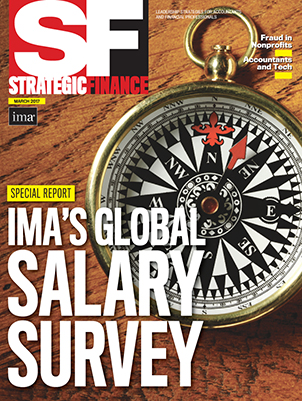PricewaterhouseCoopers (PWC) has published State of Compliance Study 2016: Laying a Strategic Foundation for Strong Compliance Risk Management, its sixth annual compliance study “designed to give corporate compliance officers benchmarking data to help them understand common industry practices today and plan for more effective, more efficient compliance operations in the future.” This year’s report focused on the business strategy portion of PwC’s proprietary compliance and ethics framework.
Based on information gathered from 600 global executives, the report draws primarily from large companies though the conclusions and recommendations are applicable to all management accountants.
In terms of tone at the top, a robust 98% of respondents have senior leadership that’s committed to effective compliance and ethics, but far fewer, about one half, believe their senior leadership is actively involved with oversight of a compliance and ethics program. Only 36% believe compliance officers “play a key role” in strategic planning, and 16% indicate that employees in their organization view the CEO as the champion of compliance and ethics.
The study showed that “only 26% of senior executives speak of compliance and ethics as part of everyday business communications.” While respondents reported that, at least quarterly, 82% of senior leaders communicate the importance of having a strong culture of ethics and compliance, the vast majority use email rather than face-to-face methods, such as town hall or business unit meetings. The report indicates that embedding compliance and ethics into operations requires frequent reinforcement. Otherwise, ethics is unlikely to be embedded into the organizational culture, as the study showed that only 26% of senior executives include compliance and ethics in everyday business communications.
State of Compliance Study 2016 surveyed the extent to which risks related to compliance and ethics are assessed in collaboration with other risk management functions. Although roughly half of respondent companies perform specific compliance and ethics risk assessment activities, only 21% use surveys of employee attitudes as a source of information for their risk evaluations. The report notes that “Critical to effective risk assessment and the implementation of control programs is the ability to identify the persons within the organization responsible for specific risks, which is not always straightforward.” Sixty-seven percent of respondents stated that their organization has a process in place to identify the “owner” of specific compliance and ethics risks, i.e., those responsible for addressing or monitoring that risk. Of the 17 specified compliance and ethics-related risks—such as fraud, money laundering, bribery or corruption, and conflicts of interest—11 are owned by legal and specialized compliance and ethics functions rather than by managers of business units. The report states that organizations may be relying on specialized functions to manage risks rather than on business unit risk owners who are more able to make changes in operations.
The report concludes that “organizations where senior leadership is more committed to compliance are more often taking actions to inject compliance management into both strategy and everyday operations.” These organizations are effective in establishing the proper ethical tone at the top; they efficiently assess compliance and ethics risks together with other risk functions and build a governance and oversight structure that provides them with a high level of confidence that regulatory matters are being managed appropriately.
SUSTAINABILITY REPORTING INCREASES GLOBALLY
Another report about ethics-related matters published recently was the Conference Board’s 2016 global report on disclosures of 75 environmental and social practices by public companies in the S&P global 1200 index. Median performance on several key environmental issues improved. Water consumption was 26% lower than last year, energy use dropped 13%, and harmful emissions were lower by 6%. The report concludes from these improvements in performance that companies are managing increasingly scarce resources and adapting to a low-carbon future.
This year marked a significant increase in the number of companies in the Asia-Pacific region that reported sustainable information, which the report attributes to new regulations issued by financial market authorities and stock exchanges. The overall rate of disclosure in the region jumped from 23% to 33%, almost reaching the high level of 37% in Europe, which remained fairly constant. The disclosure rate of 17% in North America actually declined from 19% last year.
The average company reported on only 27% of the 75 social and environmental practices included in the study, which is one percentage point higher than last year. The increase was largely in social practices, such as diversity, health and safety, and labor standards, rather than environmental practices. Only 19% of companies mentioned risk from climate change. The report concludes that companies are shifting their focus to the materiality of sustainability reporting as it affects their company.
Management accountants, particularly those employed in a global setting, need to remain alert as changes occur in the evolving topic of sustainability reporting. Minimizing the use of scarce materials, lessening the polluting effects of products on the environment from their production to their use to their disposal, and other approaches are becoming more important to stakeholders of all enterprises. Management accountants need to be tracked into this trend.
IMA ETHICS HELPLINE
For clarification of how the IMA Statement of Ethical Professional Practice applies to your ethical dilemma, contact the IMA Ethics Helpline.
In the U.S. or Canada, dial (800) 245-1383. In other countries, dial the AT&T USA Direct Access Number from www.usa.att.com/traveler/index.jsp, then the above number.
The IMA Helpline is designed to provide clarification of provisions in the Statement of Ethical Professional Practice, which contains suggestions on how to resolve ethical conflicts. The helpline cannot be considered a hotline to report specific suspected ethical violations.

March 2017



